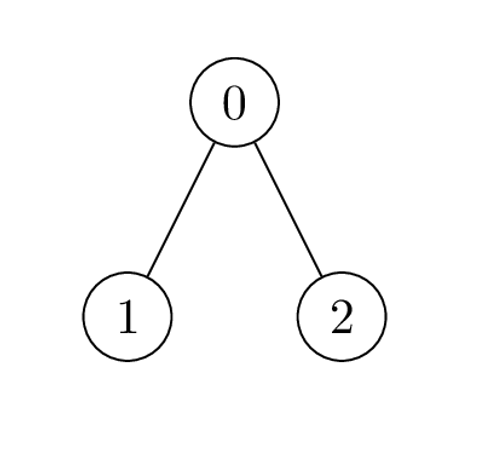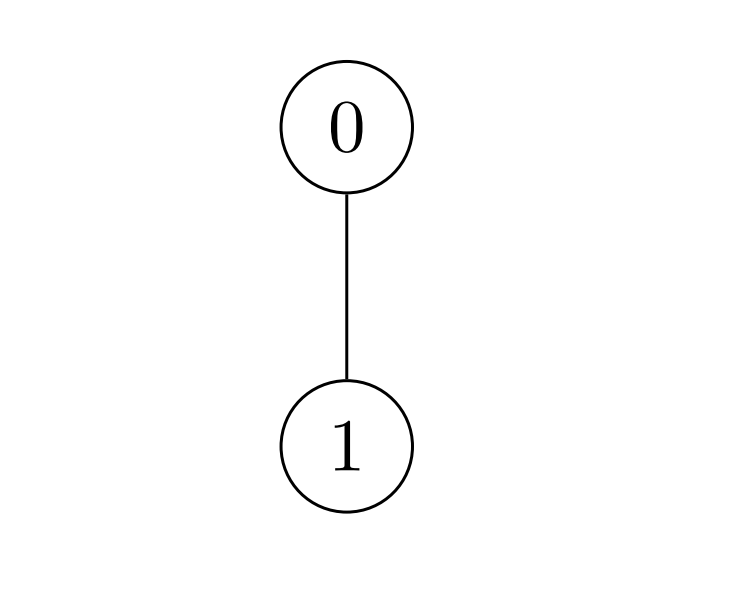| comments | difficulty | edit_url | rating | source | tags | ||||||
|---|---|---|---|---|---|---|---|---|---|---|---|
true |
Hard |
2267 |
Biweekly Contest 125 Q4 |
|
There exists an undirected tree with n nodes numbered 0 to n - 1. You are given a 0-indexed 2D integer array edges of length n - 1, where edges[i] = [ui, vi] indicates that there is an edge between nodes ui and vi in the tree. You are also given a positive integer k, and a 0-indexed array of non-negative integers nums of length n, where nums[i] represents the value of the node numbered i.
Alice wants the sum of values of tree nodes to be maximum, for which Alice can perform the following operation any number of times (including zero) on the tree:
- Choose any edge
[u, v]connecting the nodesuandv, and update their values as follows:<ul> <li><code>nums[u] = nums[u] XOR k</code></li> <li><code>nums[v] = nums[v] XOR k</code></li> </ul> </li>
Return the maximum possible sum of the values Alice can achieve by performing the operation any number of times.
Example 1:
Input: nums = [1,2,1], k = 3, edges = [[0,1],[0,2]] Output: 6 Explanation: Alice can achieve the maximum sum of 6 using a single operation: - Choose the edge [0,2]. nums[0] and nums[2] become: 1 XOR 3 = 2, and the array nums becomes: [1,2,1] -> [2,2,2]. The total sum of values is 2 + 2 + 2 = 6. It can be shown that 6 is the maximum achievable sum of values.
Example 2:
Input: nums = [2,3], k = 7, edges = [[0,1]] Output: 9 Explanation: Alice can achieve the maximum sum of 9 using a single operation: - Choose the edge [0,1]. nums[0] becomes: 2 XOR 7 = 5 and nums[1] become: 3 XOR 7 = 4, and the array nums becomes: [2,3] -> [5,4]. The total sum of values is 5 + 4 = 9. It can be shown that 9 is the maximum achievable sum of values.
Example 3:
Input: nums = [7,7,7,7,7,7], k = 3, edges = [[0,1],[0,2],[0,3],[0,4],[0,5]] Output: 42 Explanation: The maximum achievable sum is 42 which can be achieved by Alice performing no operations.
Constraints:
2 <= n == nums.length <= 2 * 1041 <= k <= 1090 <= nums[i] <= 109edges.length == n - 1edges[i].length == 20 <= edges[i][0], edges[i][1] <= n - 1- The input is generated such that
edgesrepresent a valid tree.
For any number
Additionally, no matter how many operations are performed, there will always be an even number of elements XORed with
Thus, the problem is transformed into: for the array
We can use dynamic programming to solve this problem. Let
where
We traverse the array
The time complexity is
class Solution:
def maximumValueSum(self, nums: List[int], k: int, edges: List[List[int]]) -> int:
f0, f1 = 0, -inf
for x in nums:
f0, f1 = max(f0 + x, f1 + (x ^ k)), max(f1 + x, f0 + (x ^ k))
return f0class Solution {
public long maximumValueSum(int[] nums, int k, int[][] edges) {
long f0 = 0, f1 = -0x3f3f3f3f;
for (int x : nums) {
long tmp = f0;
f0 = Math.max(f0 + x, f1 + (x ^ k));
f1 = Math.max(f1 + x, tmp + (x ^ k));
}
return f0;
}
}class Solution {
public:
long long maximumValueSum(vector<int>& nums, int k, vector<vector<int>>& edges) {
long long f0 = 0, f1 = -0x3f3f3f3f;
for (int x : nums) {
long long tmp = f0;
f0 = max(f0 + x, f1 + (x ^ k));
f1 = max(f1 + x, tmp + (x ^ k));
}
return f0;
}
};func maximumValueSum(nums []int, k int, edges [][]int) int64 {
f0, f1 := 0, -0x3f3f3f3f
for _, x := range nums {
f0, f1 = max(f0+x, f1+(x^k)), max(f1+x, f0+(x^k))
}
return int64(f0)
}function maximumValueSum(nums: number[], k: number, edges: number[][]): number {
let [f0, f1] = [0, -Infinity];
for (const x of nums) {
[f0, f1] = [Math.max(f0 + x, f1 + (x ^ k)), Math.max(f1 + x, f0 + (x ^ k))];
}
return f0;
}impl Solution {
pub fn maximum_value_sum(nums: Vec<i32>, k: i32, edges: Vec<Vec<i32>>) -> i64 {
let mut f0: i64 = 0;
let mut f1: i64 = i64::MIN;
for &x in &nums {
let tmp = f0;
f0 = std::cmp::max(f0 + x as i64, f1 + (x ^ k) as i64);
f1 = std::cmp::max(f1 + x as i64, tmp + (x ^ k) as i64);
}
f0
}
}public class Solution {
public long MaximumValueSum(int[] nums, int k, int[][] edges) {
long f0 = 0, f1 = -0x3f3f3f3f;
foreach (int x in nums) {
long tmp = f0;
f0 = Math.Max(f0 + x, f1 + (x ^ k));
f1 = Math.Max(f1 + x, tmp + (x ^ k));
}
return f0;
}
}

